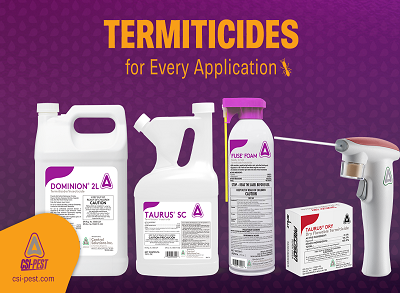
Expert Solutions
Embarking on a career in pest management is a journey filled with challenges and continuous learning. For newly hired pest management professionals, treating for termites can be particularly enlightening, with valuable lessons learned through hands-on experience. In this article, we delve into the aspects of termite treatment that no one explicitly tells you about but are crucial for success in the field.
Patience is a Virtue: Termites are Masters of Concealment
No one quite prepares you for the stealthy nature of termites. Known as silent destroyers, these tiny but destructive pests are experts at concealing their presence. As a pest management professional, you'll quickly learn that patience is a virtue when it comes to termite inspections. The real challenge lies in finding their cryptic evidence and uncovering their hidden colonies within the structures you're tasked to protect.
It's Not One-Size-Fits-All: There are Different Types of Termites that Damage Structures
While textbooks provide valuable information about termite behavior, the real-world scenario is far more nuanced. Since different termite species exhibit distinct behaviors, and no two jobs are ever exactly alike, a tailored approach to treatment is often required. Understanding the specific behaviors and biology of the termites infesting a structure, and the types of evidence they leave behind, become vital lessons learned on the job.
Navigating the Maze: Access Challenges and Difficulties
For many starting their career in pest management, the intricate mazes, lengthy mud tubes, and extensive galleries that termites create within a structure can come as a surprise. Finding and accessing all the nooks, crannies, and obscure places where termites might be hiding can become a bit of a puzzle and is rarely ever convenient to get to. Crawling through tight areas, navigating attics, and exploring crawl spaces are all part of the job, and with it comes lessons on the importance of adaptability and resourcefulness.
The Unseen Obstacles: Dealing with Unexpected Structural Challenges
Structural intricacies can present unexpected obstacles during termite treatments, and each situation brings forth a unique set of challenges. Learning to adapt your treatment strategies to various construction types, materials, conditions, and designs becomes a skill developed through real-world encounters. What works in one scenario may not be as effective or appropriate in another, emphasizing the need for a flexible approach.
Translating Technical Jargon: Mastering Client Communication
Through time and experience in this career field, you will become armed with complex technical and scientific knowledge about the pests of the industry, the active ingredients used to manage them, and the product labels you are required to follow. Finding ways to effectively convey the complex information you’ve learned to clients in a simple and easy-to-understand manner can be difficult. Translating pest management jargon into layman's terms without compromising the facts is a skill that often comes through trial and error. Clients appreciate clear and honest communication, and mastering this art will enhance your effectiveness as a pest management professional.
It's Not a One-and-Done Deal: The Reality of Post-Treatment Monitoring
Post-treatment monitoring is an aspect of termite management that can catch new professionals off guard. The notion that a single treatment solves the problem is a misconception. While there are many termiticide options that have been rigorously tested and demonstrate years of efficacy, don’t assume that the treatment will last forever. There are factors that can affect a termiticide’s persistence in the soil, and once that active ingredient and protection breaks down, it is possible for new infestations to occur. Learning the importance of regular follow-up inspections and continued monitoring for termite activity is a lesson often learned through the realization that termite management is an ongoing process.
Mother Nature's Unpredictability: Facing Various Weather Conditions
Be prepared to experience a range of uncomfortable and unfavorable weather conditions while scheduling and performing termite inspections and treatments. Working in diverse weather, such as scorching heat or pouring rain, is bound to become a reality. New professionals quickly learn to adapt their strategies and schedules to accommodate Mother Nature's unpredictable moods.
The Emotional Aspect: Dealing with Stressed Clients
Interacting with stressed and concerned clients is a challenge not always discussed in training. During these interactions, it’s important to remember that termites present damage and risk to people’s most valuable asset – their home. Learning to handle emotional situations, reassure clients, and provide the necessary information with empathy becomes a crucial skill. Pest management is not just about treating pests; it's also about managing relationships.
Embracing Growth: The Continuous Learning Curve
Perhaps the most significant lesson is the acknowledgment that the learning curve in pest management is continuous and changes are always on the horizon. New scientific discoveries, advancements in technology, changes in the regulatory landscape, newly introduced species, updated labels, and evolving industry practices necessitate a commitment to ongoing education. Embracing this reality ensures that you stay at the forefront of your field.
On the Road to Becoming a Seasoned Professional
Learning how to perform termite treatment services is a dynamic and evolving journey for newly hired pest management professionals. The lessons learned on the job, often the hard way, contribute to the development of a well-seasoned and knowledgeable expert. Embrace the challenges, learn from every encounter, be open to the wisdom shared by others, keep abreast of new information, and remember that the field is a vast classroom where experiences can profoundly shape your expertise.
Video Link to Taurus Dry Lab Demonstration:
https://youtu.be/dLjurILVDUs?si=zJmG8rhs-iDG0gCp

